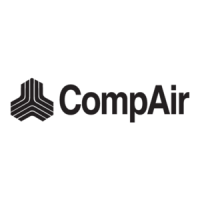3. Safety regulations
15
• Above 105 dB(A): special ear protectors, which are
suitable for the noise level and the spectral
composition of the noise must be available. A
corresponding warning sign must be fixed to each
entrance door.
Take care that the noise transmission through walls and
frames does not result in too high a noise level in the
surrounding areas.
Oils, greases and other chemical substances
When handling oils, greases and other chemical
substances, observe the safety regulations for this
product! Be careful when handling hot fuels and
consumables (danger of burning or scalding)!
Rooms subject to explosion hazards
Danger
Compressor units must never be operated in areas
subject to explosion hazards!
(Exception: Special units with the corresponding
technical modifications)
3.7 Storage of compressors
All compressors are protected against corrosion at the
factory for transport and for brief storage before
commissioning.
If the compressors are to be stored for period
exceeding six months, additional precautions must be
taken.
Compressors which are to be shut down for a lengthy
period must also be protected from corrosion.
Since corrosion occurs more quickly in damp
atmospheres than in dry conditions, it is not possible to
specify a maximum permissible standstill time which will
apply in all cases.
Note
The following aspects must be taken into account for
storage of storing compressors.
The compressor should be stored in a dry building
which should be heated if possible.
This is particularly true during the months of winter.
If there is a risk that the temperature will fall or rise
above the limits of -10 °C/14 °F to +65 °C/149 °F , the
electrical controller must be removed and stored in
ambient temperatures of +5 °C/41 °F to +30 °C/86 °F.
Before commissioning the compressor all the electrical
and electronic components and units should be
checked for the ingress of water or condensation.

